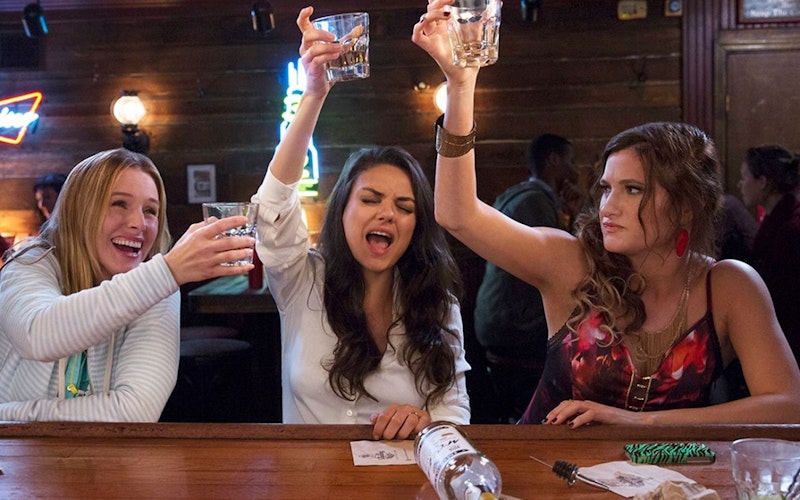
Movies
Why Can’t Bad Moms Make Room For Any Good Dads?
Bad Moms has been playing to throngs of moms enjoying a girls’ night out. Moviegoing mothers have resonated with and guffawed at these onscreen alter egos, who fiercely love their children but still feel like failures.
The movie opens with Amy (Mila Kunis) running in high heels from breakfast to school drop-off to a late arrival at work. When we follow her home, we find out Amy’s husband (David Walton) isn’t only her third child—he’s also having a cyber affair. He’s your modern-day doofus, unaware of his wife’s sacrifices or harried life and eager to seek the sexual favors of another woman. When the affair comes to light, Amy’s world comes crashing down.
She decides to pursue her version of self-care: hitting up the town with two other overworked moms (Kathryn Hahn and Kristen Bell). They stay out too late, try to get Amy to hook up with a man, and hilariously romp through a supermarket flinging sugary cereal while buying booze and a stuffed marlin. The women unite over being “bad moms.”
The “bad mom” mantra becomes Amy’s campaign slogan when she runs for PTA president. Her openness encourages other women to stand up to confess their own “bad mom” moments. In the school’s gym, they enact a secular ritual of confession—calling out the ways they haven’t met up to some idealized standard of motherhood and finding solidarity in their failures.
Confession and vulnerability without the Gospel isn’t good news. It’s just our dirty laundry.
It’s interesting, and perhaps humorous, that this solidarity is not found in being called to something higher, but by setting the bar lower. Yet confession and vulnerability without the Gospel isn’t good news. It’s just our dirty laundry. There is a place for dirty laundry, for knowing we’re not alone. But dirty laundry begins to smell after awhile. As Psalm 51 reminds us, we need “cleansing with hyssop” to be “whiter than snow.” We need confession in the context of a savior who removes our sin “as far as the east is from the west.” The moments of vulnerability in the movie point to an ache in our culture to be really known by someone who knows the worst about us but loves us still—and then calls us to a better way of living.
Ultimately, Bad Moms calls its characters to seek solace solely in their kids, at the expense of other relationships. Marital intimacy is lacking (despite the movie’s nudity and sexual humor). In fact, there isn’t an instance of an intact, healthy marriage. Even Kristen Bell’s married mother of four simply exchanges roles with her husband. Once a hot mess, at the end of the movie she’s wearing makeup and carrying her latte while her husband struggles with their double stroller. No one is any more connected; there is no sense of family mission, mutual submission, or team effort. There is only a fight for a bigger slice of the pie.
It’s a shame that Bad Moms lacks a single instance of what vulnerability could look like between husband and wife. Martin Luther called marriage a “matter of divine seriousness” that “seeks nothing but the person of the spouse.” Yet the only love Bad Moms espouses is between a mother and child, to the exclusion of anything else. The men in the movie are either overgrown children or like the man Amy ends up with: a male version of a girlfriend who cooks dinner and runs you a bath. Bad Moms is a laugh-out-loud movie that does well to see motherhood as noble and challenging. Yet when it so easily puts motherhood on a pedestal, while fatherhood (let alone marriage) isn’t afforded the same level of empathy, it doesn’t do moms any favors. Sure, we’re all bad moms. But we’re also bad dads. And bad spouses and neighbors and friends. Thankfully the Gospel doesn’t leave us there. It offers forgiveness, and a way to seek the good.
Topics: Movies, Culture At Large, Arts & Leisure, Home & Family, Family, Marriage, Parenting